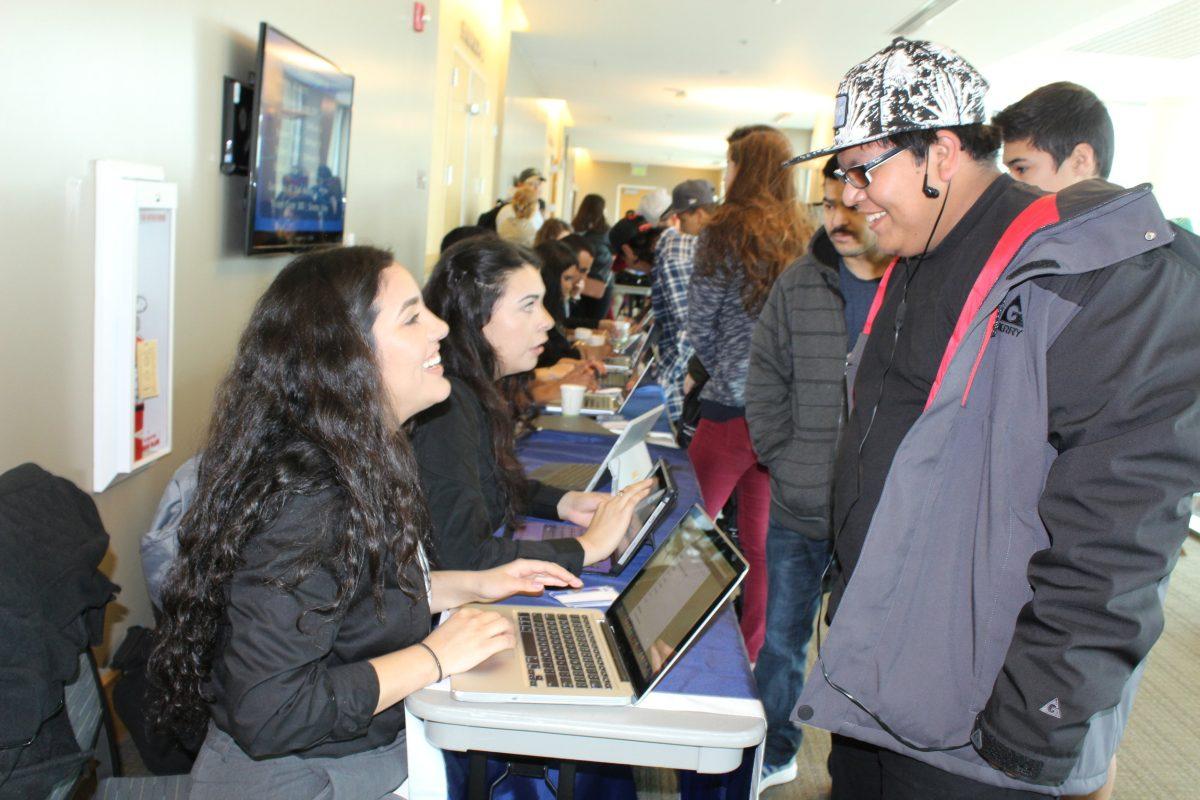Recently immigrated Latino parents and their high school children saw the plethora of Sonoma State University’s academic opportunities during the 2017 Latino Family Summit.
These parents and children attended the summit on Saturday in the Student Center. The summit presented topics ranging from counseling services to the Dream.US scholarship program to help Latino families better understand the American education system, according to coordinator of college readiness programs Magali Telles.
“The whole point is, ‘What are the different pathways to college?’” Telles said. “But more importantly, for this community that doesn’t see a lot of representation at their own high schools… we’re giving them an opportunity to see Latinos closer to their peer group.”
In an introductory speech, President Judy K. Sakaki stressed that attending college is possible, affordable, and that a university is a place where all students can be successful at.
“There are so many opportunities that you may not know about, but others will believe in you—maybe sometimes even more than you believe in yourself,” Sakaki said.
After Sakaki initiated the event, two Sonoma State alumni served as keynote speakers. The second was Dr. Cirilo Cortez, a Gates Millennium Scholar who also received a Ph.D. in education from UC Davis. Cortez gave future university students three tips for success.
“If you have faith in yourself, you will succeed… you have to have that grit,” Cortez said before making his final point, “take advantage of resources—you can’t do it alone.”
After the speeches, students and parents broke off into groups for workshops. For two rotating workshops—one about transfer pathways and majors, the other on how to balance college costs— Nu Alpha Kappa fraternity members helped male students, while Lambda Theta Nu sorority members helped female students. Counselors presented at a separate workshop for parents during this time.
Following the workshops, local organizations tabled at a resource fair. The Santa Rosa Police Department and the La Luz Center, along with on-campus clubs and resources, were among those featured, according to Nu Alpha Kappa president Erick Nuñez-Aguilar.
Nuñez-Aguilar, one of Nu Alpha Kappa’s many first-generation students, said the resource fair was helpful in promoting “better community relations.”
“This is our opportunity to tell [undocumented students] that you can [attend college]… and in the end, making this temporary sacrifice of coming out and obtaining a degree is going to open a world of opportunities that you otherwise wouldn’t be able to have,” Nuñez-Aguilar said.
Telles said she coordinated the summit with help from an “army of students,” including two EAP Ambassadors. The Lambda Theta Nu sorority’s Latina Youth Leadership Conference inspired the summit program, which began in 2008. Joselynne Calvillo, Lambda Theta Nu president, said the sorority was the first Latina-centric one established both at Sonoma State and on the west coast. Nationwide chapters of Lambda Theta Nu use the leadership conference to encourage female high school students to attend their colleges. In 2008, they teamed up with Telles and the Nu Alpha Kappa fraternity to extend this service to male students through the first Latino Family Summit.
“We want to see the difference in our community and continue increasing the number of Latino students at four-year universities,” Calvillo said.
Edgar Sanchez Larios, a Nu Alpha Kappa representative for the summit’s planning committee, said members of the fraternity, Lambda Theta Nu, and Sonoma State’s outreach office planned the event.
The planning committee had to reach out to and prepare for both parents and students throughout Sonoma County, including those from Piner High School and Elsie Allen High School, Sanchez Larios said.
“We’re talking about Latino families, most of whom are immigrant families,” he said. “The children were perhaps born here and have lived here their entire life, but their parents come from Latin American countries and don’t have a lot of experience with the college system here in the United States.”
Sanchez Larios said the California Dream Act, which allows eligible undocumented students to receive state funding for college attendance, received some of its lowest application numbers for the 2017 – 2018 school year.
Calvillo said the anti-immigrant rhetoric and legislation from the Trump administration may scare undocumented students away from taking proper advantage of Sonoma State’s resources.
“It is because students are scared of what may happen if they expose their personal information to our new government,” Calvillo said. “So many threats have been thrown out there to undocumented people that even fulfilling their dreams of a higher education are put on hold until they can feel some kind of security.”
Sanchez Larios said he thinks the Latino Family Summit provided an opportunity for Sonoma State to be “present in the conversation.”
“We want to send a very clear message that college should be in their plans… and that they will have the support of people—of allies—that are willing to help them navigate through college,” Sanchez Larios said.
Nuñez-Aguilar said he hopes Sonoma State’s upcoming Undocu-Resource Center, which will provide unique services for undocumented students, will be ready before the next Latino Family Summit.





![[Both photos courtesy of sonoma.edu]
Ming-Ting Mike Lee stepped in as the new SSU president following Sakakis resignation in July 2022](https://sonomastatestar.com/wp-content/uploads/2024/04/CC4520AB-22A7-41B2-9F6F-2A2D5F76A28C-1200x1200.jpeg)


























